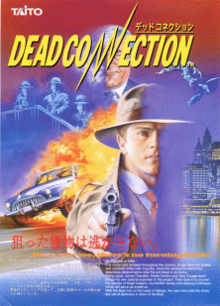Dead Connection
| Dead Connection | |
|---|---|
 Japanese arcade flyer | |
| Developer(s) | Taito |
| Publisher(s) | Taito |
| Director(s) | Masaki Ogata Ichiro Fujisue Hidehiro Fujiwara |
| Designer(s) | Kenji Kaido Jiro Tonegawa |
| Programmer(s) | Okazu Taiyaki Yuichi Kohyama Junichiro Noguchi |
| Artist(s) | Hisakazu Kato Masami Kikuchi Masahiro Kato |
| Composer(s) | Yoshiro Horie |
| Platform(s) | Arcade |
| Release |
|
| Genre(s) | Shoot 'em up |
| Mode(s) | Single-player, multiplayer |
| Arcade system | Taito F1 |
Dead Connection[a] is an arcade video game released by Taito in 1992.[2][3] The game takes place on September 5, 1953 "in a big city somewhere". It features a group of detectives who set out to fight a crime family. The game has a strong film noir vibe, shown through the appearance of the detectives and the featuring of a female protagonist. Each stage is preceded by a short cinematic interlude that explains the transition between the game's different locales.
Gameplay[edit]
When the player moves their character to within arm's length of an enemy, the shoot button triggers a melee attack. The player can also lie prone to evade gunfire, and perform a diving somersault in order to quickly take cover behind tables, plants, pillars, statues, and other fixtures.
Instead of using scrolling each stage takes place against a non-moving but richly detailed backdrop—beginning with the lavish interior of a posh hotel. Most of the environment is destructible and the scenery becomes visibly degraded by bullet holes throughout the prolonged firefights.
The game seems to take specific inspiration from the 1987 mobster film The Untouchables. Two of the main characters bear an unmistakable resemblance to Andy Garcia and Kevin Costner who both starred in that film as George Stone/Giuseppe Petri and Eliot Ness, respectively.
Reception[edit]
| Publication | Score |
|---|---|
| Computer and Video Games | 69%[4] |
| Sinclair User | 80/100[5] |
In Japan, Game Machine listed Dead Connection on their October 1, 1992 issue as being the seventeenth most-successful table arcade unit of the month.[6]
Notes[edit]
References[edit]
- ^ Akagi, Masumi (13 October 2006). タイトー (Taito) (in Japanese) (1st ed.). Amusement News Agency. p. 44. ISBN 978-4990251215.
{{cite book}}:|work=ignored (help) - ^ Yanma (October 1992). "Super Soft Hot Information - Video Game: デッドコネクション". Micom BASIC Magazine (in Japanese). No. 124. The Dempa Shimbunsha Corporation. p. 243.
- ^ S.E.A. (December 1992). "Arcade Machine: Dead Connection - Un imperio de gangsters". Micromanía (in Spanish). Vol. 2, no. 55. HobbyPress. p. 105.
- ^ Boone, Tim (October 1992). "Arcade Action - Dead Connection". Computer and Video Games. No. 131. EMAP. pp. 78–79.
- ^ Harrod, Gary (October 1992). "Coin Ops - Dead Connection - Taito". Sinclair User. No. 128. EMAP. p. 42.
- ^ "Game Machine's Best Hit Games 25 - テーブル型TVゲーム機 (Table Videos)". Game Machine (in Japanese). No. 435. Amusement Press, Inc. 1 October 1992. p. 33.
External links[edit]
